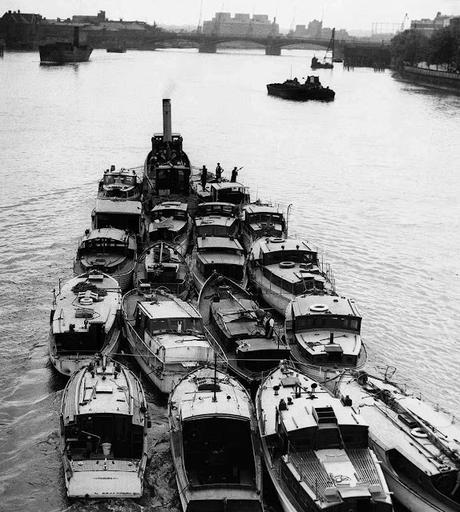The Second World War had begun in western Europe on 1 September 1939, when Germany invaded Poland. In Belgium and France there was a long winter of waiting as German and Allied forces, including the British Expeditionary Force (BEF), faced each other along the border defences.
Then on 10 May 1940, two German armies moved eastward. A smaller one swept through Holland and Belgium into northern France, drawing the main Allied forces north to meet it. The other, main German force advanced through Luxembourg, broke through the French lines at Sedan, and sliced across northern France to the coast. Moving rapidly with armoured columns, these armies trapped the Allies in an ever-decreasing pocket.
The Germans took Boulogne on 25 May and Calais the next day, leaving Dunkirk as the only viable port from which the BEF, part of the French army and the remains of the Belgian army could escape.
The Allies had to defend a small pocket around Dunkirk that was under constant attack. Many thousands of men were crammed into streets and buildings, and along the beaches – so they were very vulnerable to intense German air attacks and shelling. There was little time to plan and organize an orderly evacuation, and effective means of communication were scarce.
The Germans had put the main docks at Dunkirk – the best place from which to evacuate troops – out of action. The two alternatives – the spindly breakwater, or mole, on the east side of the harbour, and the beaches to the north of the port – were far from ideal. The beaches at Dunkirk shelve gently into the sea. Even at high tide, a destroyer couldn’t approach within a mile of the shore, and troops had to be ferried out in small craft.Rescue was painfully slow at first – only 8,000 men were rescued on the first day. It took several days for the operation to gather pace.Operation Dynamo was the rescue operation implemented by the Royal Navy. It was co-ordinated by Vice Admiral Bertram Ramsay and his small team in Dover Castle. There, beneath the fortress, a network of tunnels deep within the cliffs became the nerve center controlling the evacuation of Allied forces.From 19 May, realising that rescue by sea would be necessary, Ramsay and his staff at Dover were making plans and arranging for ships to evacuate the British Expeditionary Force. On 26 May they were ordered to put their plans into action.Dunkirk, and the surrender of France that followed some three weeks later, left Britain isolated, vulnerable and under threat of imminent invasion. The BEF had abandoned or destroyed nearly all its heavy equipment at Dunkirk. Hitler declared the evacuation a decisive victory for Germany.By rescuing the bulk of the army, in what was the biggest evacuation in military history, Operation Dynamo returned to Britain a priceless asset – most of her trained and experienced troops. If they had been lost, the whole conflict might have taken a very different course. It was a critical moment for Britain in the Second World War.‘We must be very careful not to assign to this deliverance the attributes of a victory. Wars are not won by evacuations.’ Winston Churchill, 4 June 1940
The evacuation as publicised as a miracle to boost public morale. The sucessful rescue , across the seas that stayed unusually calm for nine days, was thereaftern referred to as 'the miracle of Dunkirk'
But as well as this, the terrifyong propspect that the depleted British armed forces might have to fight the Germans on home soil caused the nation, galvanised under Winston Churchi;; to decore itself entirely not only effectively but perhaps suprisingly , with total confidence in eventual victory. The 'Dunkirk spirit’, reflecting a nation unoted and working against apparently impossible odds to thwart Hitler's ambitions was born.

If Operation Dynamo had failed,
If the British Expeditionary Force
all perished at Dunkirk
then we would have been invaded
and our Jewish citizens
would have died in gas chambers
built on British soil.
Without those rescued soldiers,
D Day would not have happened
nor the liberation of France.
Hitler would have conquered Europe
and we would not be free.
The crews who sailed those little ships
changed the course of history
and awoke The Dunkirk Spirit
that led to victory,
Thanks for reading. Adele
Email ThisBlogThis!Share to TwitterShare to Facebook
